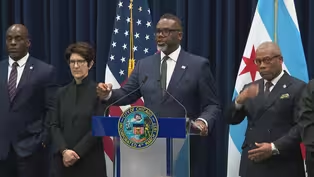Chicago Tonight: Black Voices
Black Illinoisans Are Experiencing Homelessness at a High Rate
Clip: 1/15/2025 | 7m 49sVideo has Closed Captions
A new report says homelessness among Black Illinoisans is more than twice the national average.
Homelessness among Black Illinois residents is more than double the national average, according to a report from the University of Illinois Chicago in collaboration with the Illinois Office to Prevent and End Homelessness.
Problems playing video? | Closed Captioning Feedback
Problems playing video? | Closed Captioning Feedback
Chicago Tonight: Black Voices is a local public television program presented by WTTW
Chicago Tonight: Black Voices
Black Illinoisans Are Experiencing Homelessness at a High Rate
Clip: 1/15/2025 | 7m 49sVideo has Closed Captions
Homelessness among Black Illinois residents is more than double the national average, according to a report from the University of Illinois Chicago in collaboration with the Illinois Office to Prevent and End Homelessness.
Problems playing video? | Closed Captioning Feedback
How to Watch Chicago Tonight: Black Voices
Chicago Tonight: Black Voices is available to stream on pbs.org and the free PBS App, available on iPhone, Apple TV, Android TV, Android smartphones, Amazon Fire TV, Amazon Fire Tablet, Roku, Samsung Smart TV, and Vizio.
Providing Support for PBS.org
Learn Moreabout PBS online sponsorshippeople experiencing homelessness in the United States on a single night was the highest ever recorded in 2024?
the overall rate increased by 18%.
And in Chicago, the number of unhoused people has tripled from 2023 2024. but black homelessness is seeing an even higher uptick in Illinois.
More than double the national average.
These figures are part of a report by the University of Illinois-Chicago in collaboration with the Illinois Office to Prevent and End Homelessness.
Here to talk more about this disparity is Christine Haley, the state's chief homelessness officer.
Welcome back, striker tonight.
Thank you so much.
why are we seeing this disparity, Christine, what is what's the cause So first, we have to understand what happens during a crisis.
>> So for many people who are homeowners its an emergency happens such as you lose a job or there's a medical emergency.
You can pull equity out of your home to be able to withstand that crisis.
If we look at black families in Chicago, we understand income winds, according to a report that the Chicago Department of Housing did a few years ago that the average income of a Chicago mean median income for an average Chicago families about $90,000 a year.
But for black families, it's about $27,000 a So that's income side.
On the asset side.
The Caller wealth study, which recently came out found that front liquid assets for white families in Chicago.
The average liquid assets for white families is about $27,000.
And for black families as $1000.
There's an emergency.
You reach out to your friends and family if they also are in the same economic situation that you're only have $1000 of cash on hand to address housing situation.
And then if we look at what our our formal ways to support folks, I'm at the time of crisis that the way in which people might access the Chicago and Cook County.
Homeless prevention call Center.
That's where you would call to say I'm behind on my rent.
I need some help.
The University of Chicago recently did a study that found that only one out of 8 people who call are able to access a resource.
So I think the structural issues that we're really trying to understand is we understand that if we look at home ownership, that's where you pull from how that has disproportionately impacted black households and not being able to access credit.
You look red lining.
You look at segregation history, course, yes, and some of the economics.
But then they're also you know, sort of the social factors that go into this disparity.
What are what are some of those?
>> So at that at the core of this, we understand that it's a lack of affordable housing.
That is the cause of of home of homelessness.
There are social factors that might make an individual Moore vulnerable such as you know, mental illness or substance use.
But that's not the true cause of what causes homelessness, what causes homelessness is that we don't have enough housing for everyone who needs it.
So the report that we really wanted to bring together stakeholders from across our state to create the racial equity round table on black homelessness that brought.
Leaders from the faith community from government, from people with lived expertise to help guide the report that the University of Illinois at Chicago completed to help us understand black homelessness in the state.
And that there are areas within the report that address evictions, for example, the impact that evictions has on black homelessness that the criminal legal system understanding child welfare and how family and how individuals and youth exit have child welfare systems.
So those types of system system involvement does, of course, have a role to play and how we can make interventions to catch people if if they fall through those systems.
But at the end of the day, we see higher rates of black homelessness because we don't have enough housing and because black folks don't have the same generational assets that can can help them.
That can help us during a crisis.
And you mentioned a couple of, you know, a couple of those factors, right?
People often think it's a matter of, you know, having made poor choices, more of that drug abuse, mental illness.
But those can be factors.
Right?
But you reference the sort of structural problems last year.
>> The Illinois Department of Public Health released the state's first health report for people experiencing homelessness what did that report tell us about the role of mental illness in homelessness.
The black community.
So the report found that the average age of death of a person experiencing homelessness is 18 years earlier than the general population.
>> So ill noise, homeless population is about 61% black.
So we look at the state of Illinois is about 14% black.
Those experiencing poverty is about 30%.
But those experiencing homelessness is 61% right.
>> of the of so we really need to understand that with if we look at mental illness, if we look pieces such as cold-related injuries, we understand from the report that people experiencing homelessness are 38 times more likely to die of a cold related injury.
Then from.
Than the general population, we understand is a cold related injury.
Me just common cold or doubts.
during the cold being outside.
So right now it is very cold.
Chicago.
I previously before being appointed to this role, I worked for Cook County Health and Hospital systems and this time of the year was a very difficult time of year because we compute Haitians, right?
So people lose their fingers.
They lose their toes.
receive below the knee, amputations become permanently disabled because of frostbite in the winter.
So I think that part of the reason why we did this report was to be able to provide the opportunity for our community to understand the impacts.
The health impacts that people experience.
Homelessness have.
And that really no one should become disabled because they have housing insecurity are living outside stations or something that you don't even consider a related to the cold.
I'm not a whole lot of time left.
Christine, a Governor Pritzker's office projects a 3.2 billion dollar deficit in the coming fiscal year.
>> While the Illinois Shelter Alliance is advocating for an additional 100 million dollars in state funding to prevent and end homelessness.
What is the likelihood that the state is able to allocate more than 290 Million.
That is already being spent on addressing this issue.
So in in 2021, Governor Pritzker signed an executive order to fight homelessness that created the infrastructure around state government to address homelessness.
>> It created our Interagency Task Force on homelessness where we have 16 state agencies that are really working towards understanding within their budgets with in there their purview.
How can they address homelessness?
We have increased funding for homelessness in the state of Illinois by over 156%.
In that we have invested in shelter, permanent housing employment Services, clinical Services and others.
So I think that we understand very clearly that we've have a need and are working towards addressing.
Biden Bans Medical Debt From Appearing on Credit Reports
Video has Closed Captions
Clip: 1/15/2025 | 7m 27s | An estimated $49 billion of debt would vanish from Americans' credit histories under the new plan. (7m 27s)
City Council Rejects Push to Weaken Protections for Undocumented Immigrants
Video has Closed Captions
Clip: 1/15/2025 | 3m 37s | After days of increasing alarm among advocates for immigrant rights, the showdown was anticlimactic. (3m 37s)
Providing Support for PBS.org
Learn Moreabout PBS online sponsorship
- News and Public Affairs

Top journalists deliver compelling original analysis of the hour's headlines.

- News and Public Affairs

FRONTLINE is investigative journalism that questions, explains and changes our world.












Support for PBS provided by:
Chicago Tonight: Black Voices is a local public television program presented by WTTW

